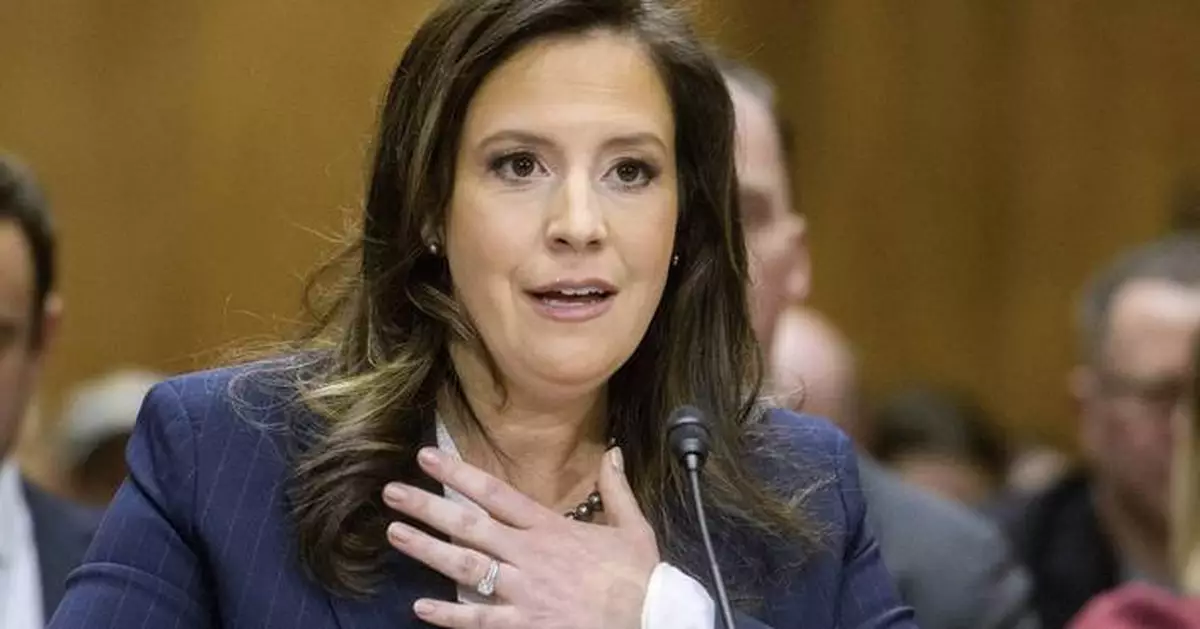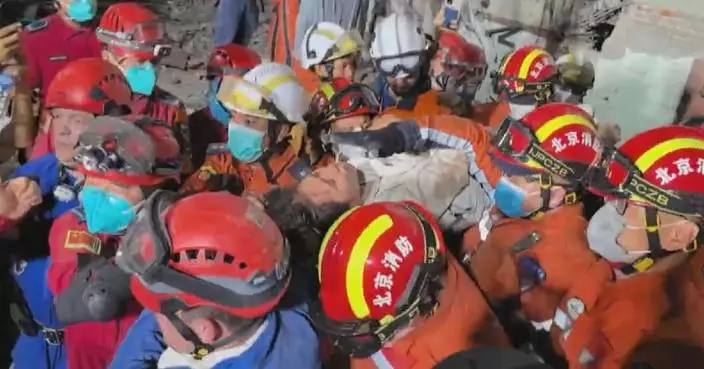WASHINGTON (AP) — President Donald Trump announced Thursday that he was pulling Rep. Elise Stefanik's nomination to be U.S. ambassador to the United Nations, a stunning turnaround for his Cabinet pick after her confirmation had been stalled for months over concerns about Republicans' tight margins in the House.
Trump confirmed he was withdrawing the New York Republican's nomination in a Truth Social post, saying that it was “essential that we maintain EVERY Republican Seat in Congress.”
“We must be unified to accomplish our Mission, and Elise Stefanik has been a vital part of our efforts from the very beginning. I have asked Elise, as one of my biggest Allies, to remain in Congress,” the president said. He did not say whom he would nominate to replace her and fill his last remaining Cabinet seat.
The abrupt withdrawal reflects growing concern among House Republicans, led by Speaker Mike Johnson, that their historically slim majority could be at risk, particularly ahead of two special elections in Florida next week. The loss of a mere handful of seats could swing the House majority to Democrats and derail their efforts to enact Trump’s sweeping agenda in the months ahead.
Johnson praised Stefanik, the former No. 4 House leader, as “selfless” and “patriotic" after Trump announced the move.
“It is well known Republicans have a razor-thin House majority, and Elise’s agreement to withdraw her nomination will allow us to keep one of the toughest, most resolute members of our Conference in place to help drive forward President Trump’s America First policies,” Johnson said in a post on X. He added that he “will invite her to return to the leadership table immediately,” although it's unclear what position she would take since there are no vacancies.
Stefanik said Thursday night that multiple issues factored into the decision, including the possibility that an election to replace her may be delayed; the upcoming special elections in Florida; and the threadbare GOP majority in the House.
“I have been proud to be a team player,” Stefanik said on Fox News' “Hannity” of the withdrawal of her nomination. "The president knows that. And he and I have had multiple conversations today, and we are committed to delivering results on behalf of the American people.”
Trump had tapped Stefanik to represent the U.S. at the international body shortly after winning reelection in November. She was seen as among the least controversial Cabinet picks, and her nomination advanced out of committee in late January, but House Republicans' razor-thin majority kept her ultimate confirmation in a state of purgatory for the last several months.
In recent weeks, it had seemed as if Stefanik's nomination would advance to the Senate floor, given two U.S. House special elections in Florida in districts that Trump easily won in 2024. Filling those vacant GOP seats would have allowed Stefanik to finally resign from the House and given Republicans, who currently hold 218 seats, a little more breathing room on passing legislation in a growingly divided Congress. Democrats hold 213 seats.
Both districts have long been Republican strongholds, and a win by either Democratic candidate would be a major surprise, but House Minority Leader Hakeem Jeffries and other Democratic leaders are looking to at least narrow the margin from November, when Trump carried both districts in the presidential election by more than 30 points.
That, coupled with Democrats’ upset in a Tuesday special election for a Pennsylvania state Senate seat in Republican-leaning suburbs and farming communities, has given Republicans pause and pushed some members into full panic mode, according to one congressional aide, who spoke on the condition of anonymity to discuss internal concerns.
Trump's statement Thursday also seemed to indicate an anxiety about the party's ability to hold on to Stefanik’s seat if she were to take on the U.N. post, even though the sprawling district in northern New York is one of the state’s most conservative and is considered to be solid Republican territory. Stefanik herself cruised to reelection last year, winning 62% of the vote over her Democratic opponent. Almost all of the counties in her district voted for Trump last year.
In a statement, Jeffries, D-N.Y., said that Trump withdrew Stefanik's nomination “because the extremists are afraid they will lose the special election to replace her.”
“The Republican agenda is extremely unpopular, they are crashing the economy in real time and House Republicans are running scared,” Jeffries continued. "What happened to their so-called mandate?”
Stefanik is the fourth Trump administration nominee who didn’t make it through the confirmation process. Previously, former U.S. Rep. Matt Gaetz withdrew from consideration for attorney general, Chad Chronister was pulled for the Drug Enforcement Administration and former Florida congressman Dr. David Weldon was yanked from contention to lead the Centers for Disease Control and Prevention.
The former congresswoman had been in a state of limbo for months, not able to engage in her official duties as a member of the 119th Congress or to participate in the action at the U.N. The vacancy of a permanent U.S. ambassador was happening at a critical moment for the international body as the world leaders had been discussing the two major wars between Russia and Ukraine and Israel and Hamas.
In late February, the U.S. mission, under Trump, split with its European allies by refusing to blame Russia for its invasion of Ukraine in votes on three U.N. resolutions seeking an end to the three-year war. Dorothy Shea, the deputy U.S. ambassador to the U.N., has been the face of America’s mission in New York during the transition.
The withdrawal of Stefanik’s nomination came after she had launched a recent farewell tour of her district, meeting with supporters and thanking them for their support. On her Instagram page, Stefanik had also been conducting what appeared to be a retrospective of her time in Congress, with one post containing images from 2016 that showed her on a cable news show and posing with supporters atop a caption that began with “Congressional throwback continued.”
Reflecting the abruptness of Trump's decision, Stefanik's last throwback post was made Thursday morning.
Amiri reported from the United Nations. Associated Press writers Anthony Izaguirre in New York, Kate Payne in Tallahassee, Fla., and Matthew Lee in Georgetown, Guyana, contributed to this report.
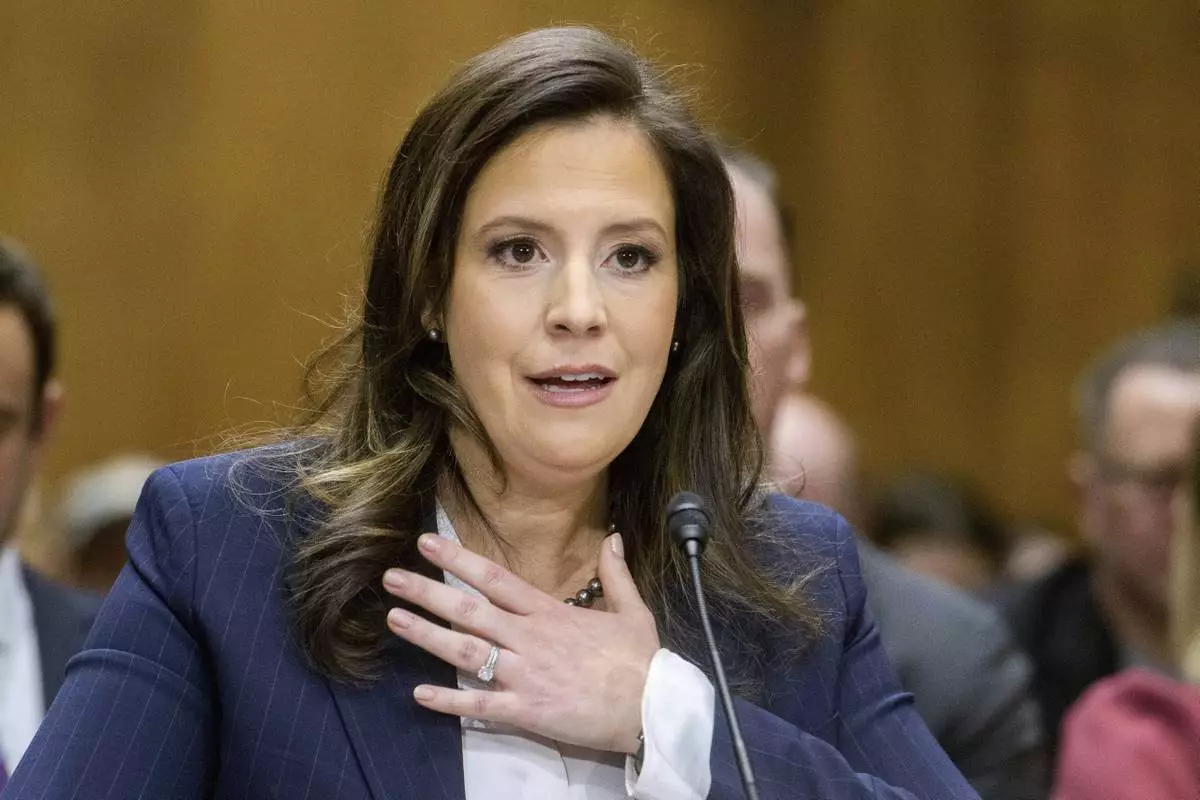
FILE - Rep. Elise Stefanik, R-N.Y., testifies during a Senate Committee on Foreign Relations hearing on her pending confirmation to be the United Nations Ambassador, on Capitol Hill, Jan. 21, 2025, in Washington. (AP Photo/Rod Lamkey, Jr., File)
DEIR AL-BALAH, Gaza Strip (AP) — Israel's military on Monday issued sweeping evacuation orders covering Rafah and nearby areas, indicating it could soon launch another major ground operation in the Gaza Strip's southernmost city.
Israel ended its ceasefire with the Hamas militant group and renewed its air and ground war earlier this month. At the beginning of March it cut off all supplies of food, fuel, medicine and humanitarian aid to the territory's roughly 2 million Palestinians to pressure Hamas to accept proposed changes to the truce agreement.
Israel's military ordered Palestinians to head to Muwasi, a sprawl of squalid tent camps along the coast. The orders came during Eid al-Fitr, a normally festive Muslim holiday marking the end of the fasting month of Ramadan.
Last May, Israel launched a major operation in Rafah, on the border with Egypt, leaving large parts in ruins. The military seized a strategic corridor along the border as well as the Rafah crossing with Egypt, Gaza’s only gateway to the outside world that was not controlled by Israel.
Israel was supposed to withdraw from the corridor under the ceasefire it signed with Hamas in January under U.S. pressure, but it later refused to do it, citing the need to prevent weapons smuggling.
Dozens gathered at a funeral for some of the 15 emergency responders killed by Israeli fire during a ground operation in Rafah last week. The International Federation of Red Cross and Red Crescent Societies called it the deadliest attack on its medics in several years.
Raed al-Nems, a spokesperson for the Palestinian Red Crescent, said the paramedics were “killed in cold blood” despite wearing uniforms and operating in clearly labeled ambulances. At funeral prayers, their shrouds were draped with Red Crescent banners.
Israel's military has said its forces opened fire on several vehicles that raised suspicions by advancing without headlights or emergency signals. The military said a Hamas operative and eight other militants were among those killed.
The United Nations humanitarian office said the dead included eight Red Crescent workers, six members of Gaza's Civil Defense, which operates under the Hamas-run government, and a U.N. worker.
Rescuers were only allowed to access the area nearly a week later to recover the bodies. Footage of Sunday's recovery operation released by the U.N. showed Civil Defense workers digging into a mound of sand and pulling out a body wearing the same orange vest as theirs.
Israel has vowed to intensify its military operations until Hamas releases the remaining 59 hostages it holds — 24 of them believed to be alive. Israel has also demanded that Hamas disarm and leave the territory, conditions that were not included in the ceasefire agreement and which Hamas has rejected.
Israeli Prime Minister Benjamin Netanyahu said Sunday that Israel would take charge of security in Gaza after the war and implement U.S. President Donald Trump's proposal to resettle Gaza's population in other countries, describing it as “voluntary emigration.”
That plan has been universally rejected by Palestinians, who view it as forcible expulsion from their homeland. Human rights experts say it would likely violate international law.
Hamas has insisted on implementing the signed agreement, which called for the remainder of the hostages to be released in exchange for a lasting ceasefire and an Israeli pullout. Negotiations over those parts of the agreement were supposed to begin in February but only preliminary talks have been held.
The war began when Hamas-led militants stormed into Israel on Oct. 7, 2023, rampaging through army bases and farming communities and killing some 1,200 people, mostly civilians. The militants took another 251 people hostage, most of whom have been released in ceasefires or other deals.
Israel's retaliatory offensive has killed more than 50,000 Palestinians, according to Gaza's Health Ministry, which does not say how many were civilians or combatants. At its height, the war had displaced some 90% of Gaza's population, with many fleeing multiple times.
Large areas of Gaza have been destroyed, and it's unclear how or when anything will be rebuilt.
Khaled reported from Cairo.
Follow AP’s war coverage at https://apnews.com/hub/israel-hamas-war
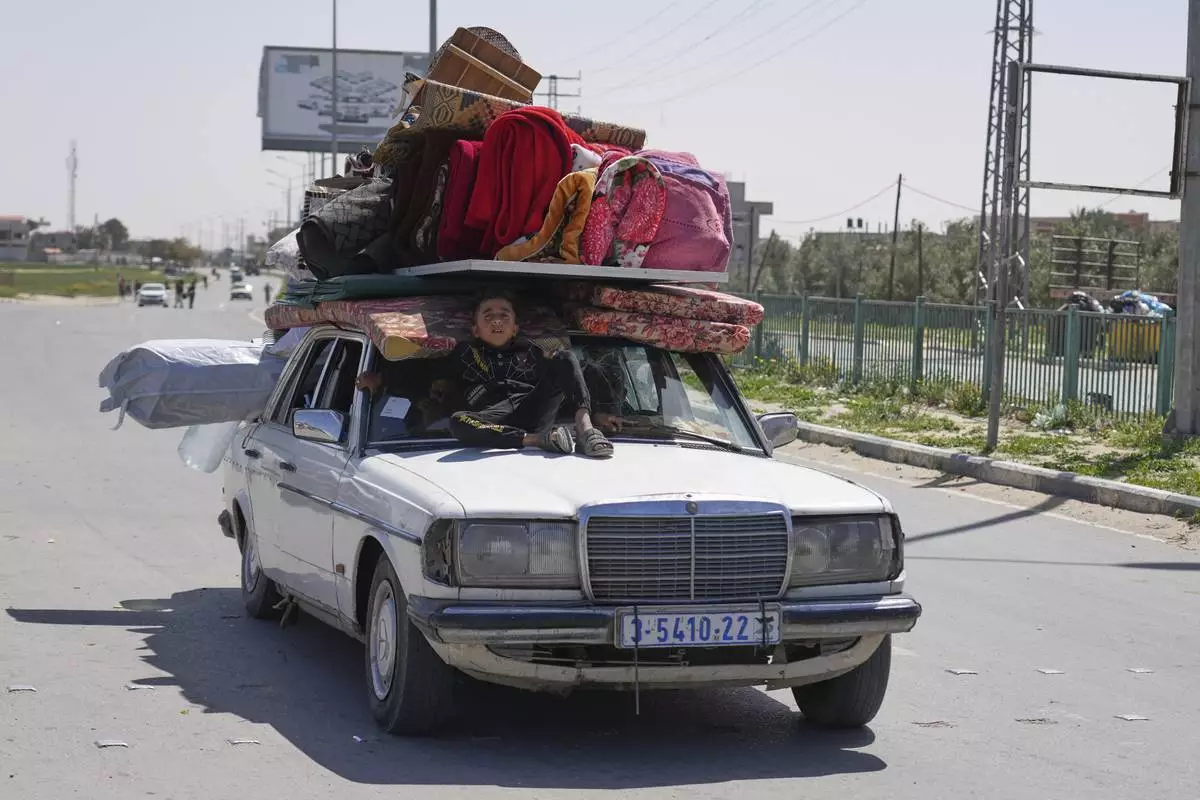
Displaced Palestinians, who flee from Rafah, arrive in Khan Younis, Gaza, on Monday, March 31, 2025, after the Israeli military issued sweeping evacuation orders covering most of Rafah. (AP Photo/Abdel Kareem Hana)
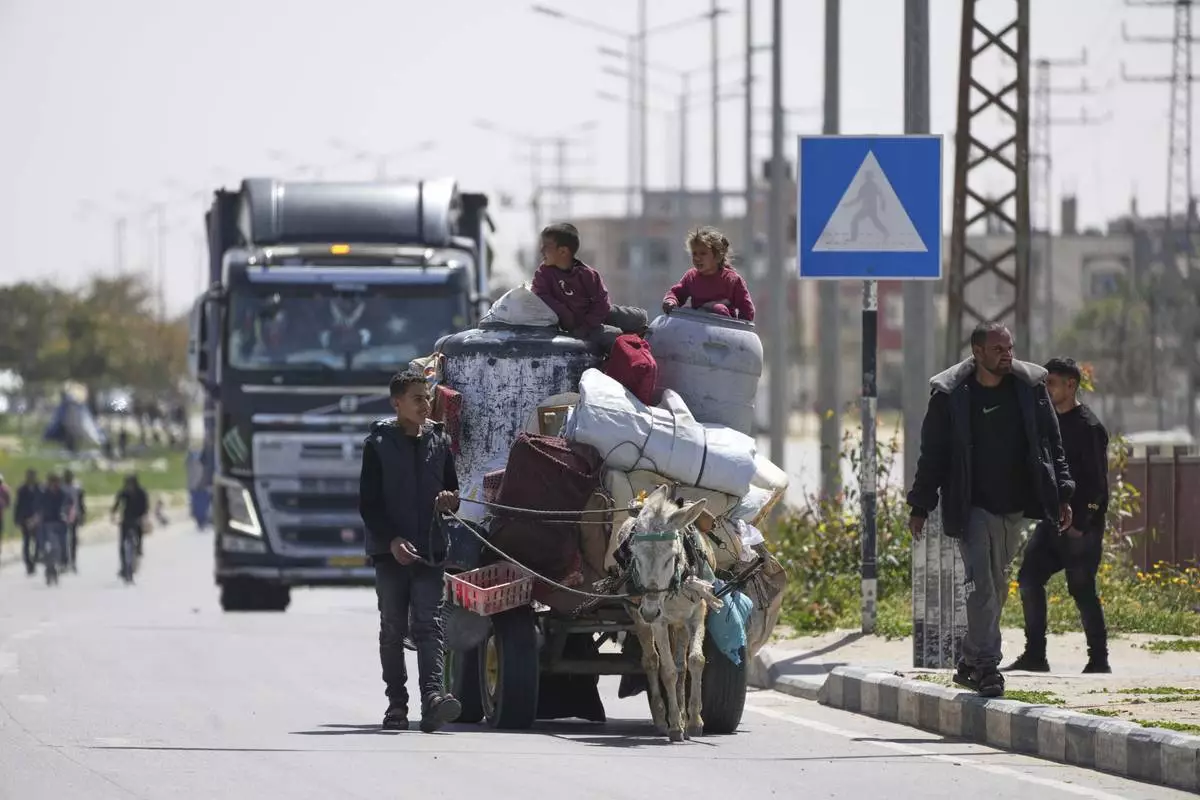
Displaced Palestinians, who flee from Rafah, arrive in Khan Younis, Gaza, on Monday, March 31, 2025, after the Israeli military issued sweeping evacuation orders covering most of Rafah. (AP Photo/Abdel Kareem Hana)
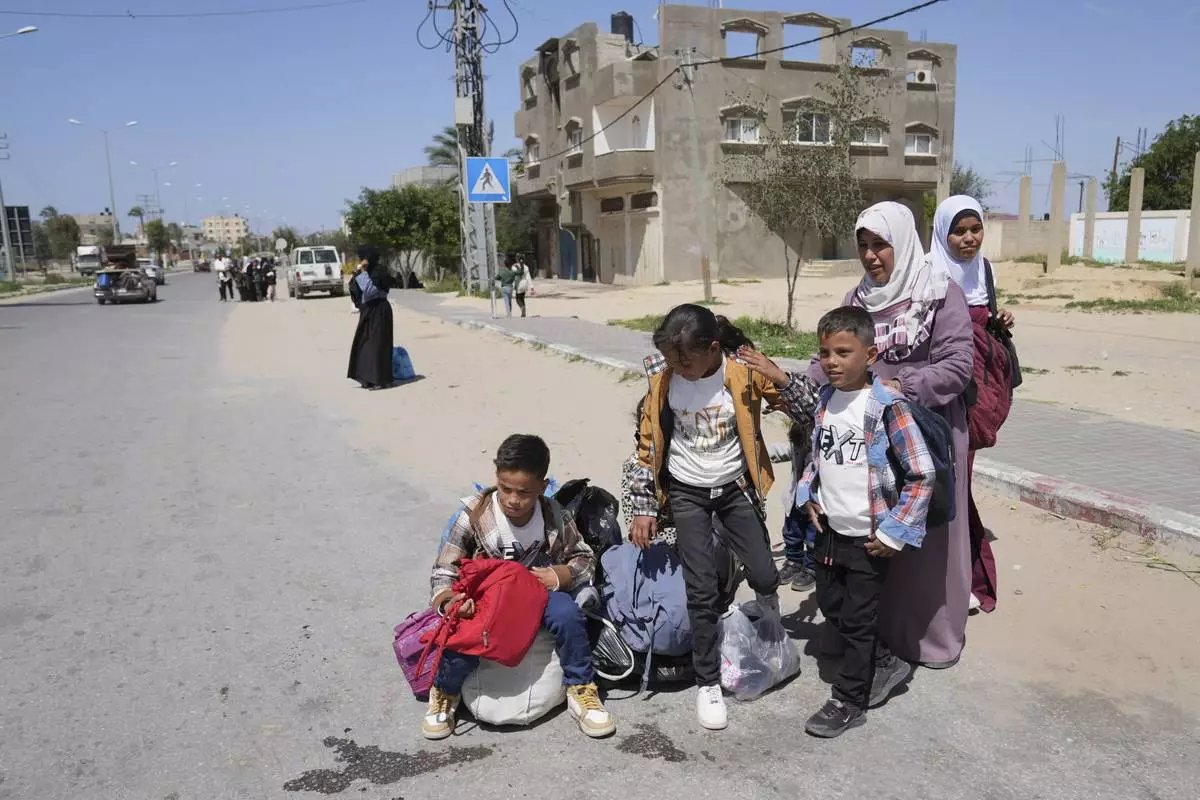
Displaced Palestinians, who flee from Rafah, arrive in Khan Younis, Gaza, on Monday, March 31, 2025, after the Israeli military issued sweeping evacuation orders covering most of Rafah. (AP Photo/Abdel Kareem Hana)
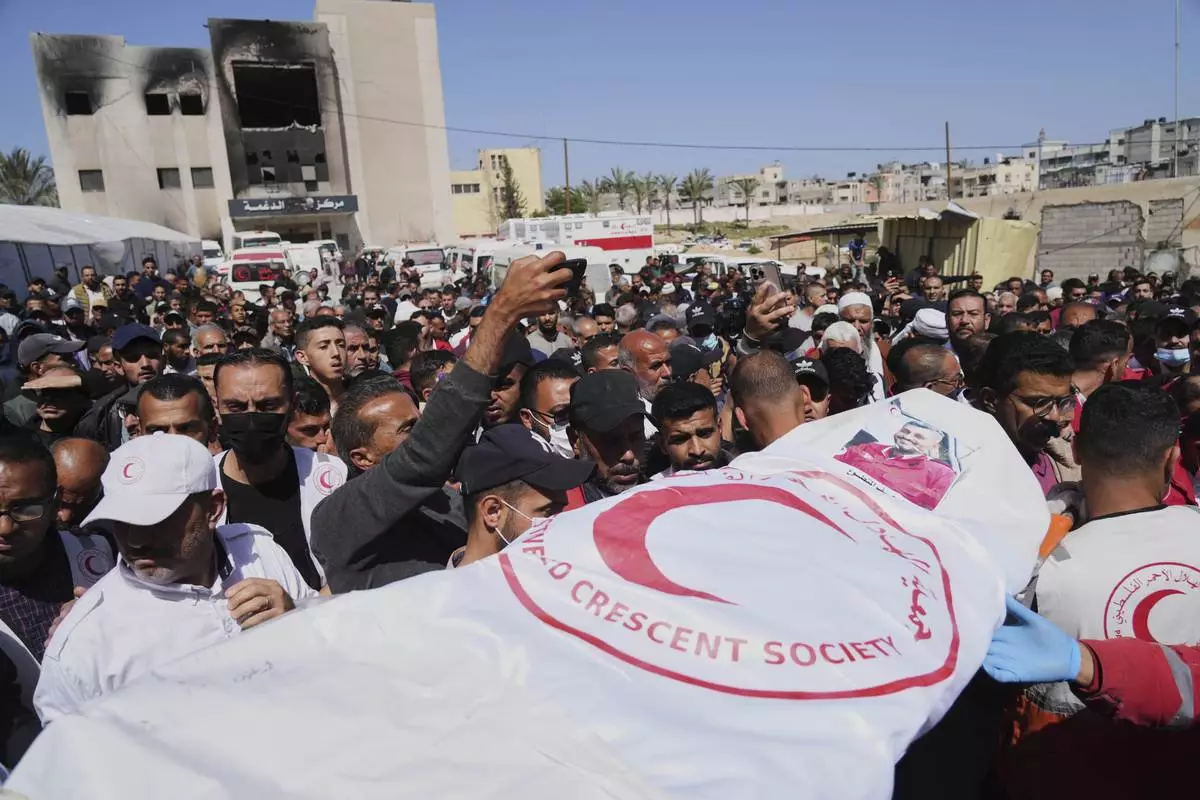
Mourners carry the bodies of 8 Red Crescent emergency responders, recovered in Rafah a week after an Israeli attack, as they are transported for burial from a hospital in Deir al-Balah, Gaza Strip, on Monday, March 31, 2025. (AP Photo/Abdel Kareem Hana)
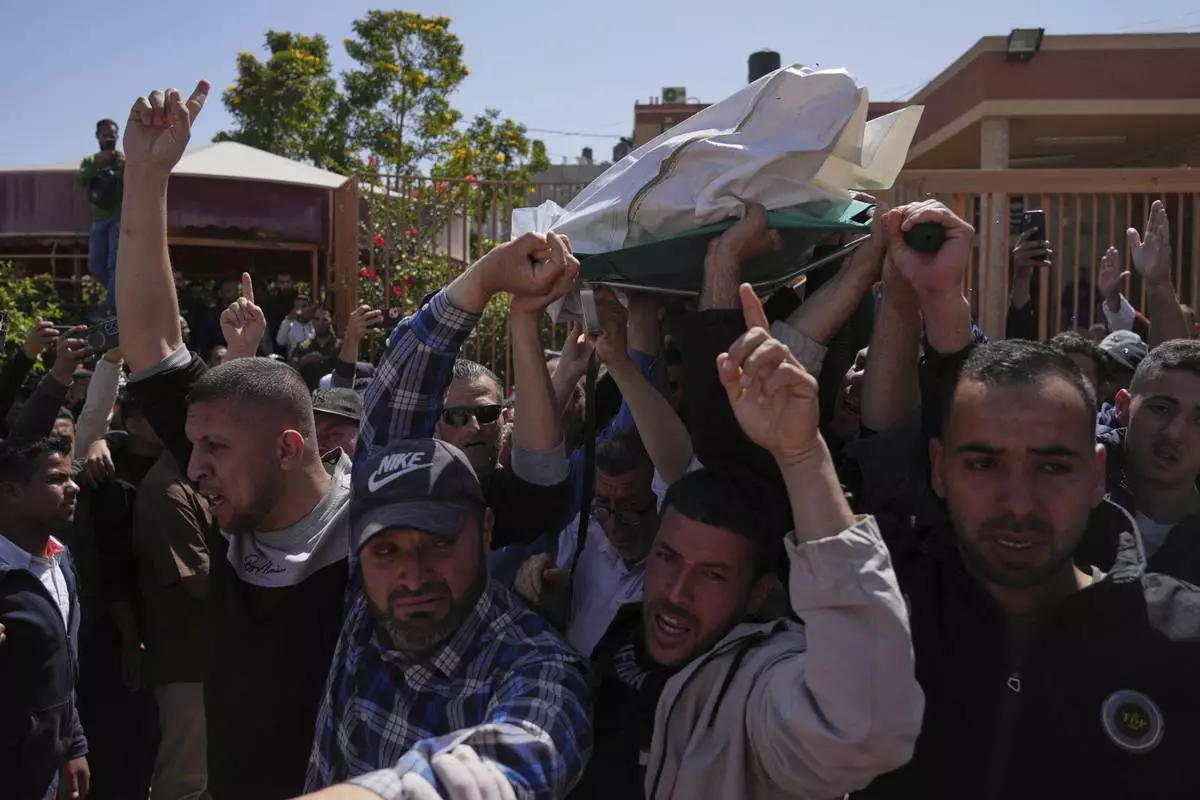
Mourners carry the bodies of 8 Red Crescent emergency responders, recovered in Rafah a week after an Israeli attack, as they are transported for burial from a hospital in Deir al-Balah, Gaza Strip, on Monday, March 31, 2025. (AP Photo/Abdel Kareem Hana)
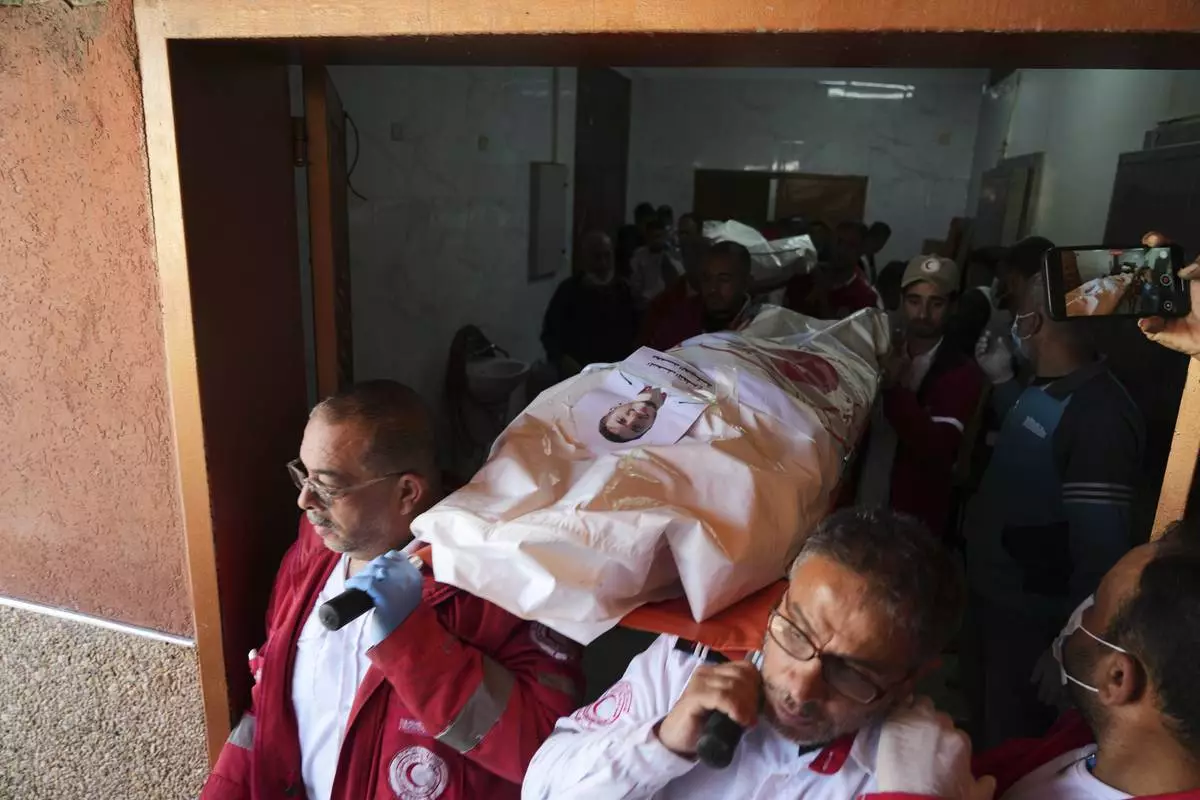
Mourners carry the bodies of 8 Red Crescent emergency responders, recovered in Rafah a week after an Israeli attack, as they are transported for burial from a hospital in Deir al-Balah, Gaza Strip, on Monday, March 31, 2025. (AP Photo/Abdel Kareem Hana)
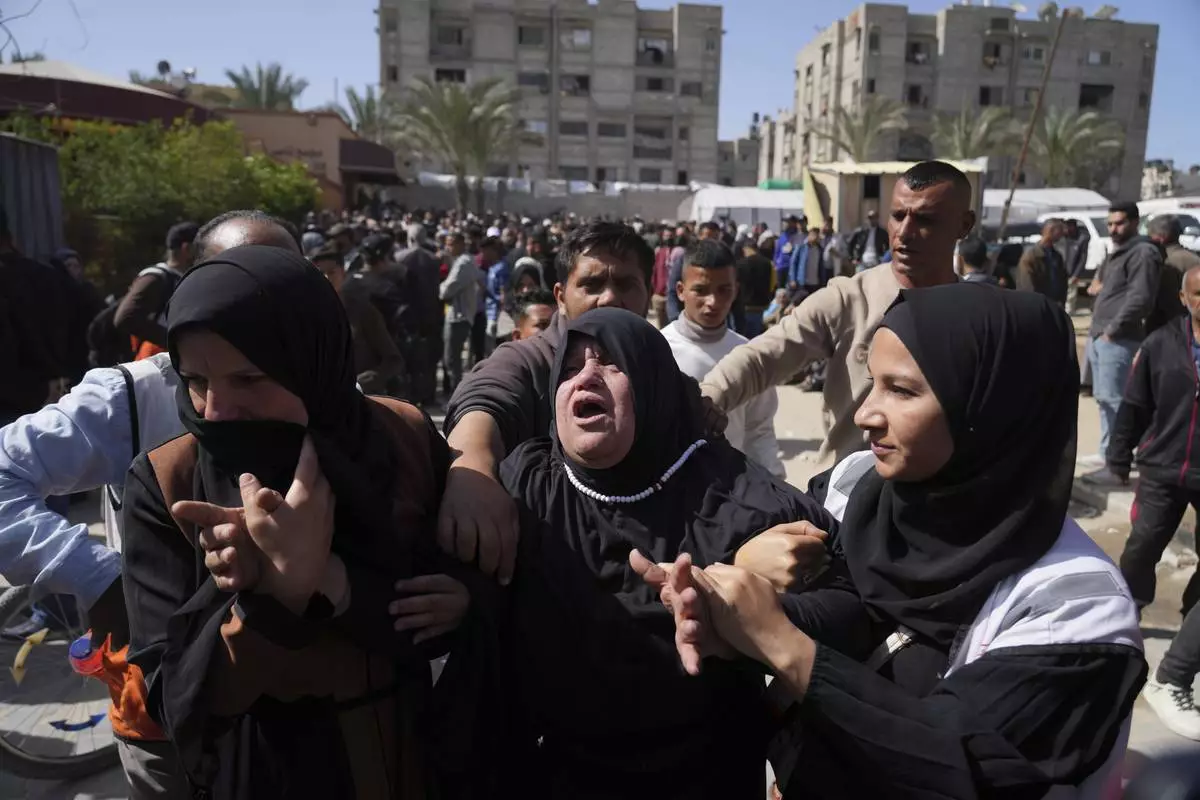
Mourners react during the funeral of 8 Red Crescent emergency responders, recovered in Rafah a week after an Israeli attack, in Deir al-Balah, Gaza Strip, on Monday, March 31, 2025. (AP Photo/Abdel Kareem Hana)
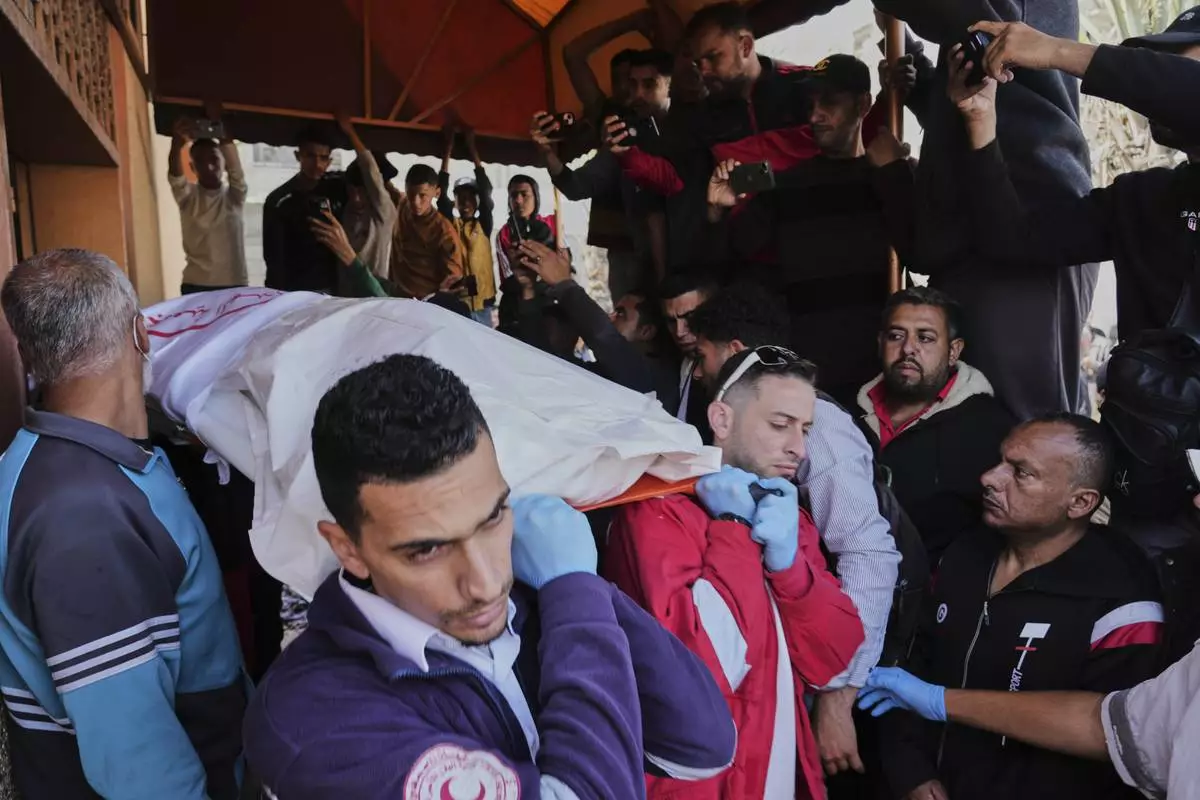
Mourners carry the bodies of 8 Red Crescent emergency responders, recovered in Rafah a week after an Israeli attack, as they are transported for burial from a hospital in Deir al-Balah, Gaza Strip, on Monday, March 31, 2025. (AP Photo/Abdel Kareem Hana)
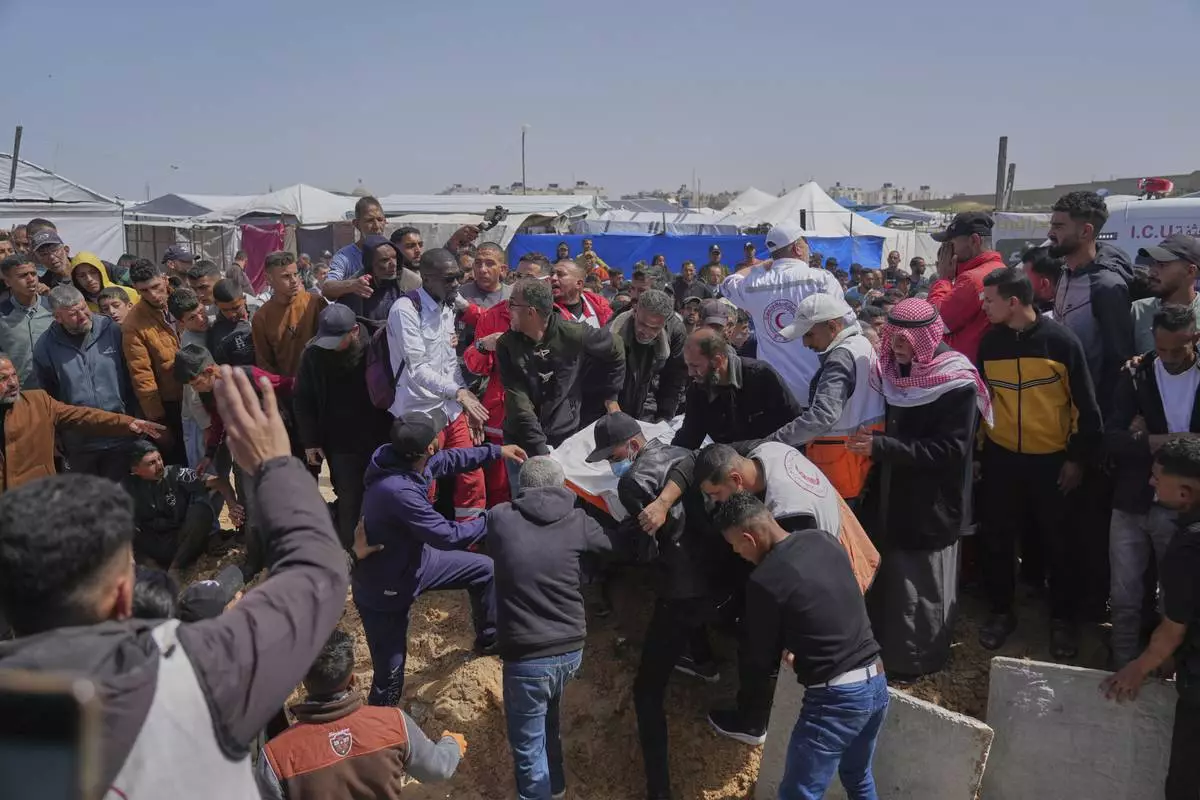
Mourners carry the bodies of 8 Red Crescent emergency responders, recovered in Rafah a week after an Israeli attack, during their funeral in Deir al-Balah, Gaza Strip, on Mon day, March 31, 2025. (AP Photo/Abdel Kareem Hana)
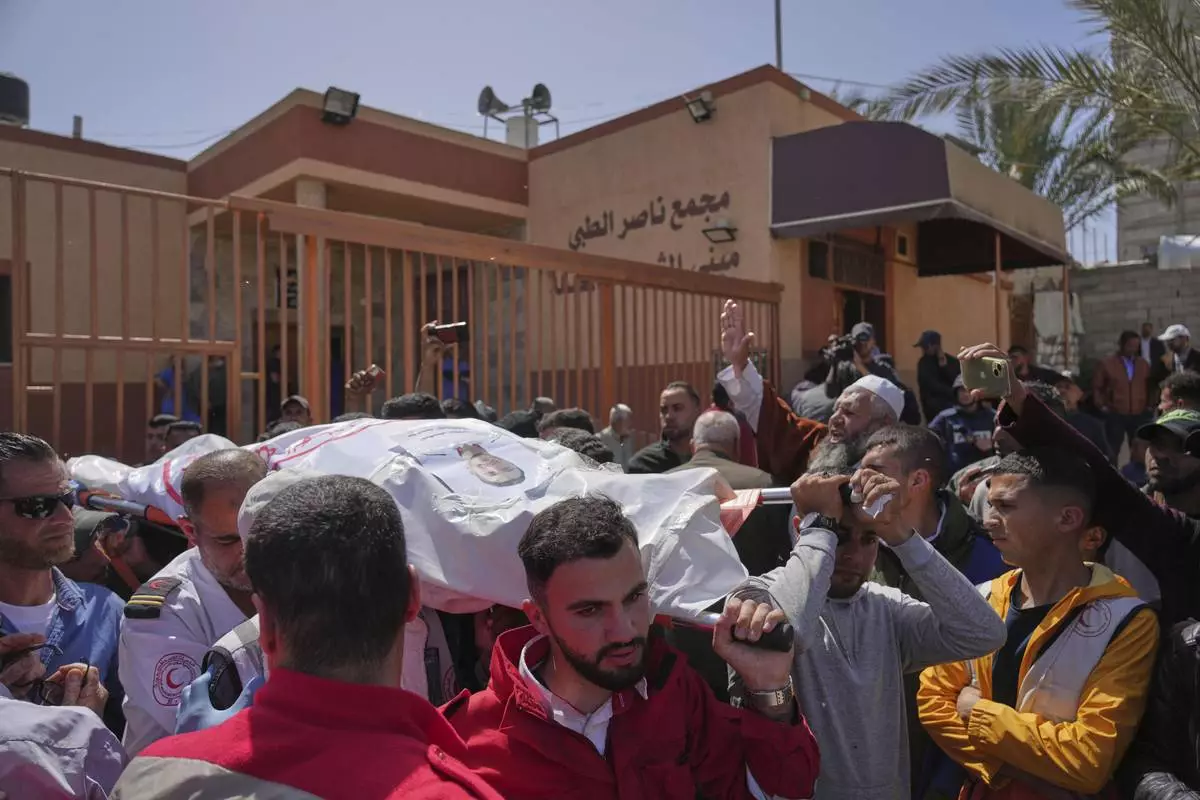
Mourners carry the bodies of 8 Red Crescent emergency responders, recovered in Rafah a week after an Israeli attack, as they are transported for burial from a hospital in Deir al-Balah, Gaza Strip, on Monday, March 31, 2025. (AP Photo/Abdel Kareem Hana)
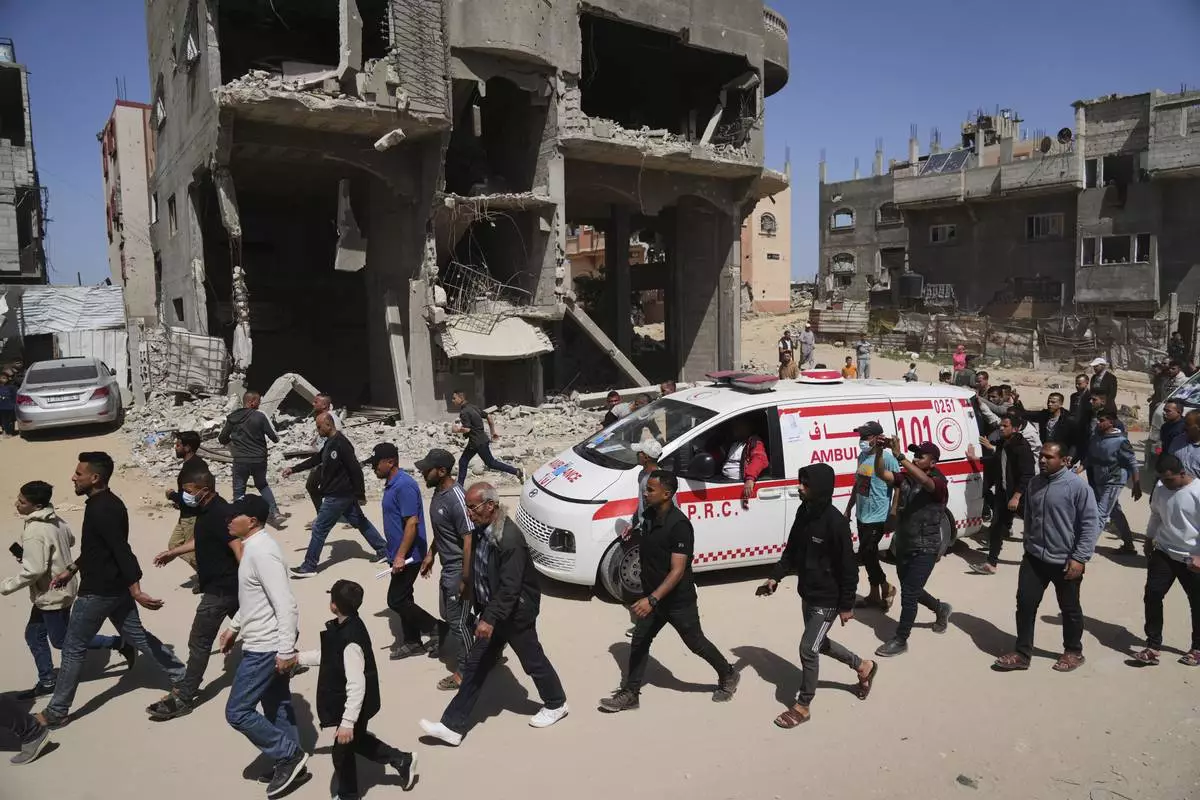
Mourners follow the convoy carrying the bodies of 8 Red Crescent emergency responders, recovered in Rafah a week after an Israeli attack, as they are transported for burial in Deir al-Balah, Gaza Strip, on Monday, March 31, 2025. (AP Photo/Abdel Kareem Hana)
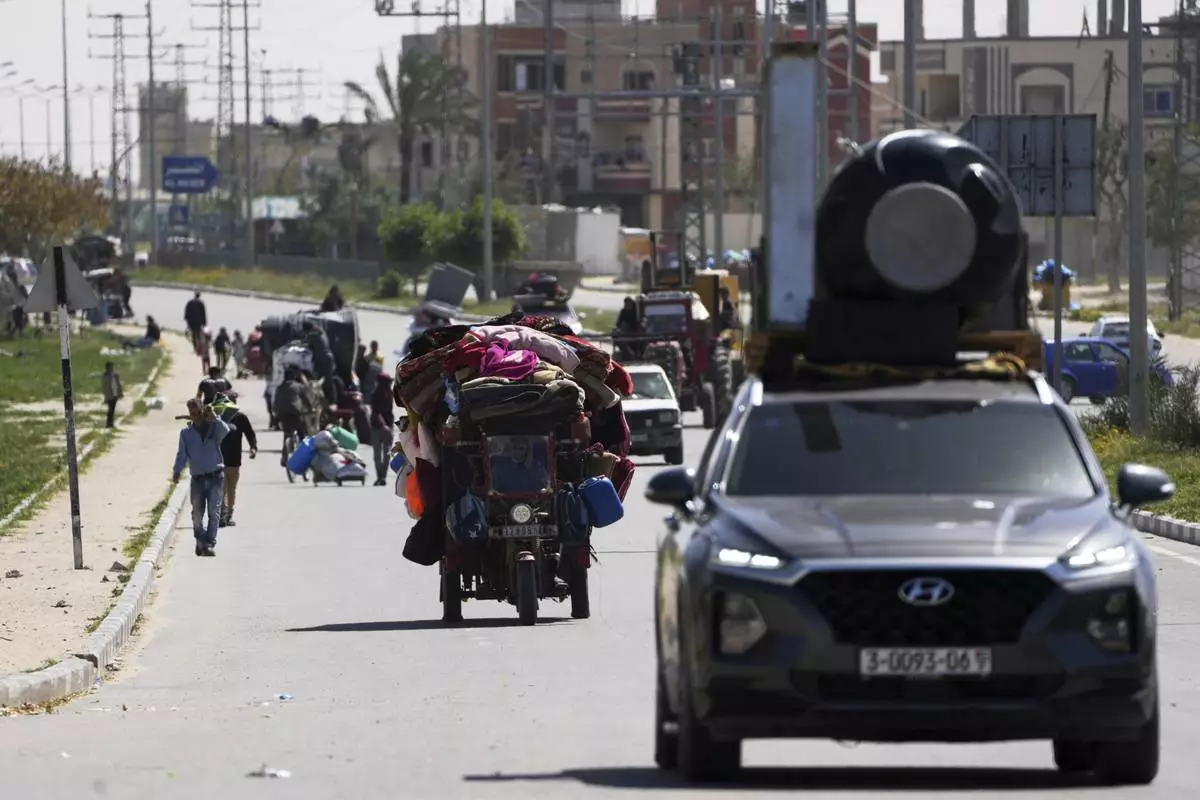
Displaced Palestinians, who flee from Rafah, arrive in Khan Younis, Gaza, on Monday, March 31, 2025, after the Israeli military issued sweeping evacuation orders covering most of Rafah. (AP Photo/Abdel Kareem Hana)
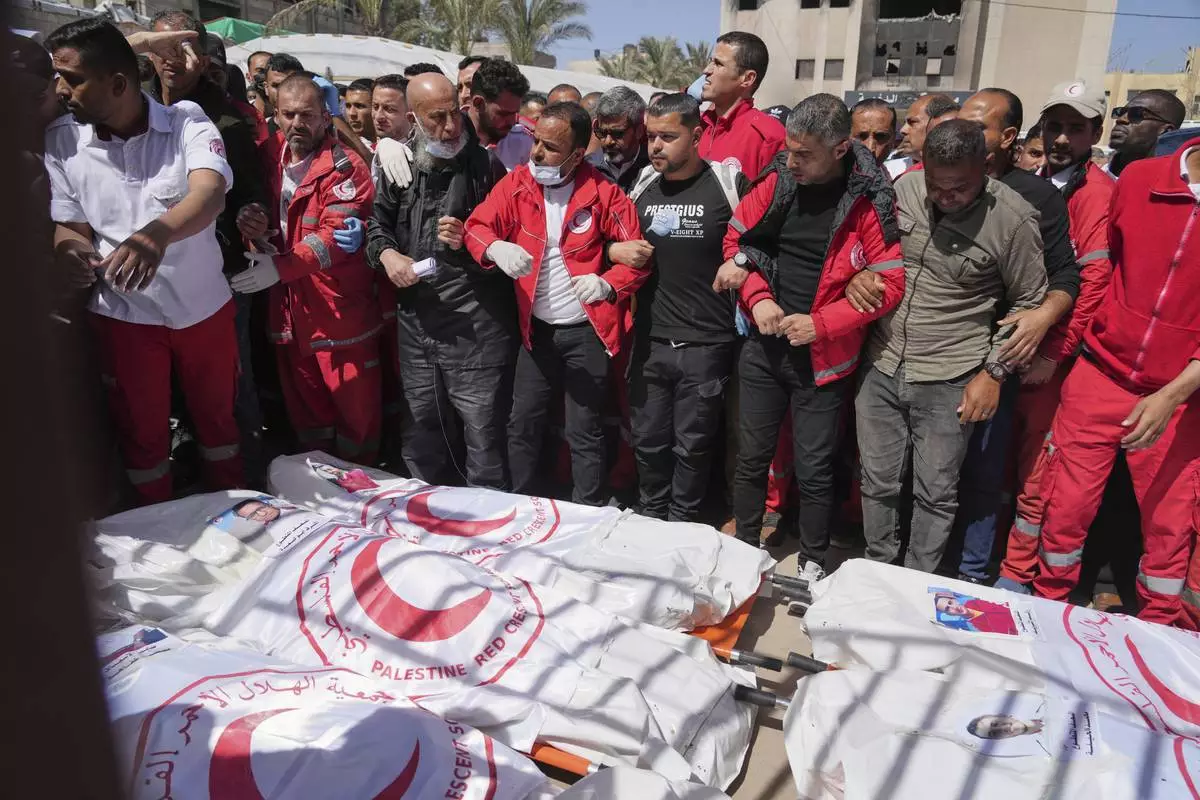
Mourners gather around the bodies of 8 Red Crescent emergency responders, recovered in Rafah a week after an Israeli attack, as they are transported for burial from a hospital in Deir al-Balah, Gaza Strip, on Monday, March 31, 2025. (AP Photo/Abdel Kareem Hana)
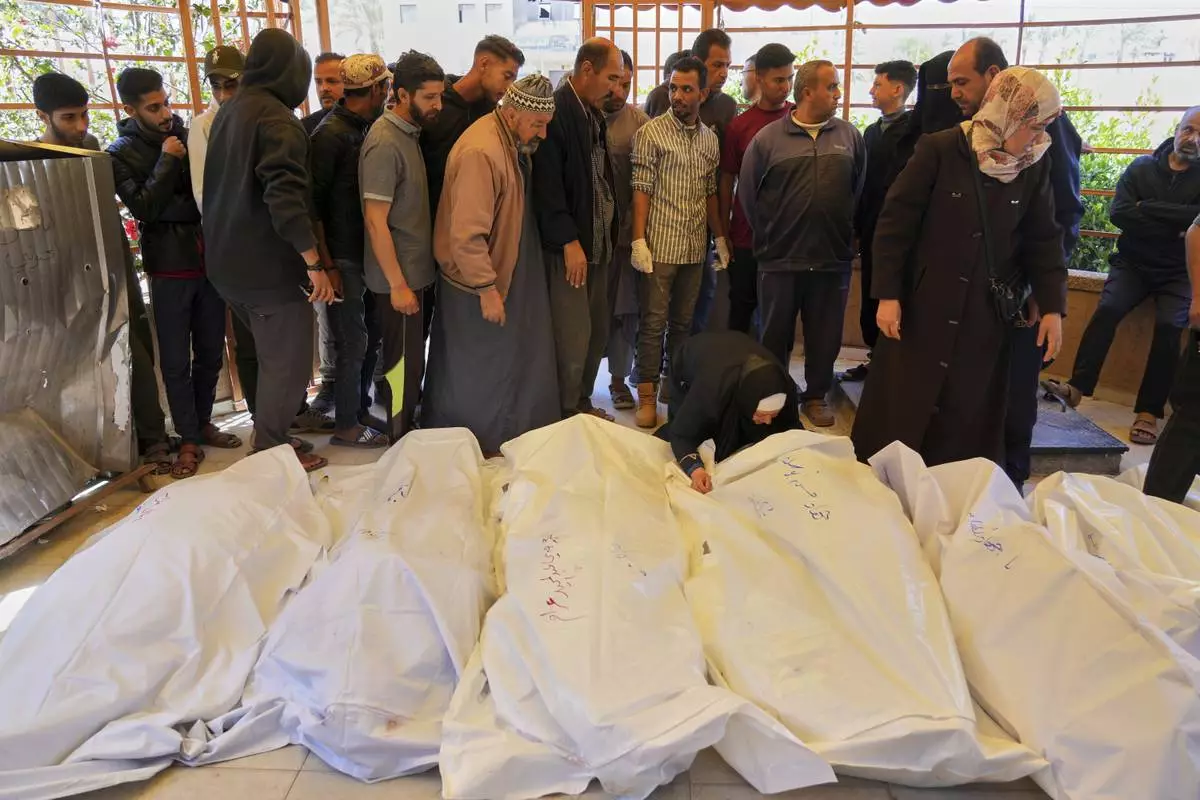
Mourners walk by the bodies of the Abu Sultan family, killed when an Israeli army strike hit their tent before their burial at the hospital in Khan Younis, southern Gaza Strip, Sunday, March 30, 2025. (AP Photo/Abdel Kareem Hana)
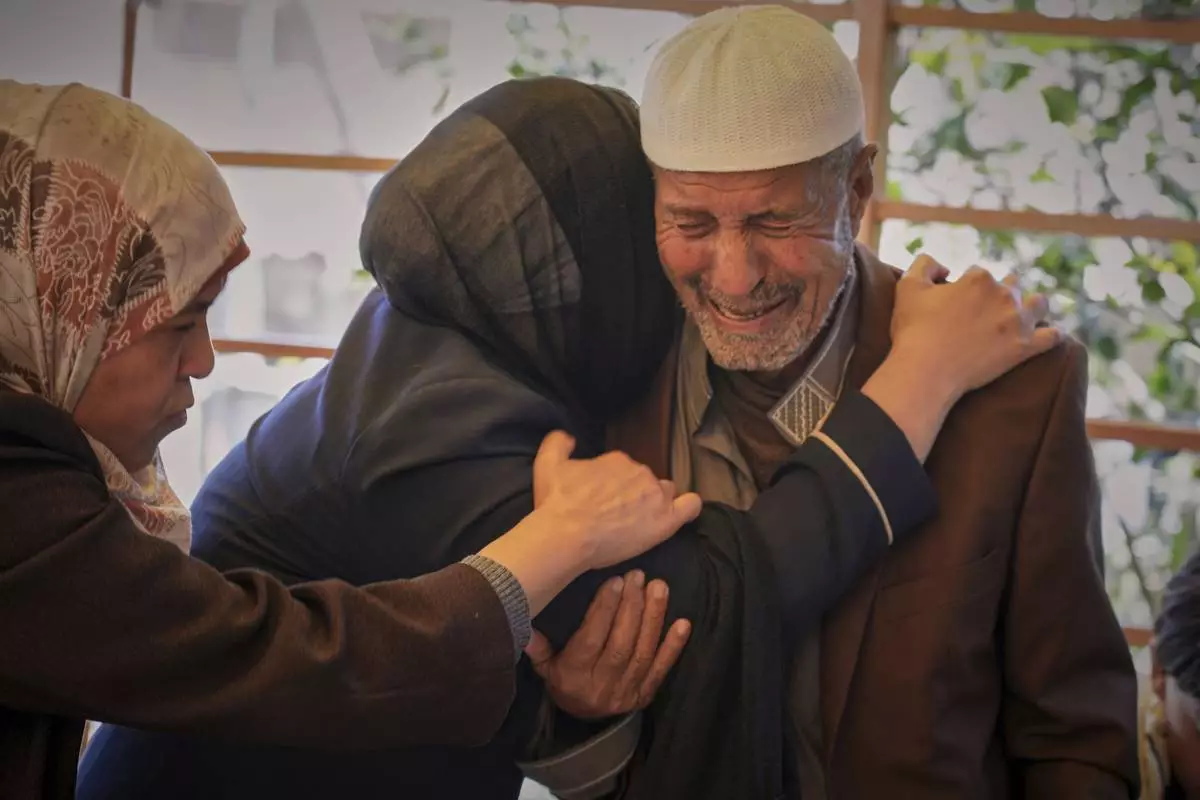
Hassan Abu Sultan mourns over the body of her son Jehad, who, along with his wife and three children, was killed when an Israeli army strike hit their tent, as heir bodies lie on the floor at a hospital in Khan Younis, southern Gaza Strip, awaiting burial on the first day of the Muslim holiday of Eid, Sunday, March 30, 2025. (AP Photo/Abdel Kareem Hana)



